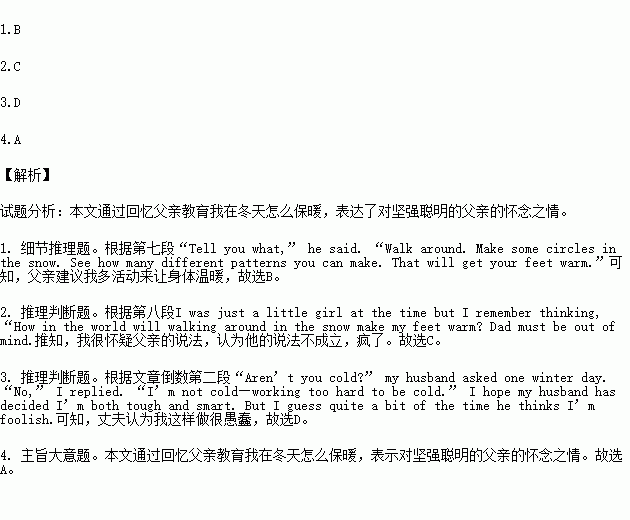题目内容
When I was a kid, I always used to wonder how in the world my father worked outside in the winter without a coat. It could be minus 20 degrees centigrade and there’d be Dad, removing snow, or perhaps chopping(砍) some wood — his coat thrown aside — wearing a shirt, a cap, and a pair of gloves.
“Aren’t you cold, Dad?” I’d ask. “No,” Dad would reply. “I’m not cold—working too hard to be cold.”
Many times I wondered whether my father was an extremely tough man, or whether he was foolish.
One time when I was quite young, perhaps five or so, I went ice fishing with Dad. It was a bright, clear day—and bitterly cold.
After we’d been out on the ice for a little while, my feet started getting cold.
“Daddy, my feet are cold.” I said.
“Yeah, it’s cold out here today,” he replied.
“Tell you what,” he said. “Walk around. Make some circles in the snow. See how many different patterns you can make. That will get your feet warm.”
I was just a little girl at the time but I remember thinking, “How in the world will walking around in the snow make my feet warm? Dad must be out of mind.”
But he was my father, after all. I made circles in the snow. I made squares. Pretty soon I was having so much fun making patterns in the snow. I forgot about my feet being cold.
Now, all these years later, I know, too, from personal experience how my father was able to take his coat off and work outside in the winter wearing just a shirt, a cap and gloves. Because I do it, too. “Aren’t you cold?” my husband asked one winter day. “No,” I replied. “I’m not cold—working too hard to be cold.”
I hope my husband has decided I’m both tough and smart. But I guess quite a bit of the time he thinks I’m foolish.
Wherever Dad is on that great big farm in the sky—I’m sure he can’t help but smile whenever I take my coat off while I’m working outside in the winter.
1.When the author’s feet felt cold, her father advised her to ________.
A. go home alone firstB. keep walking in the snow
C. draw pictures in the snowD. light a fire on the ice
2.Hearing her father’s advice, the author thought her father ________.
A. forgettableB. warm-heartedC. crazyD. cruel
3.What might the author’s husband think of her?
A. Tough.B. Smart.C. Brave.D. Foolish.
4.The author’s purpose of writing this passage is to ________.
A. remember her tough and smart father
B. show how her father cared about her
C. describe memories of her childhood
D. explain why her father loved her so much
 阅读快车系列答案
阅读快车系列答案
